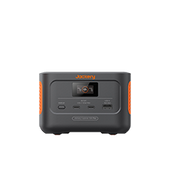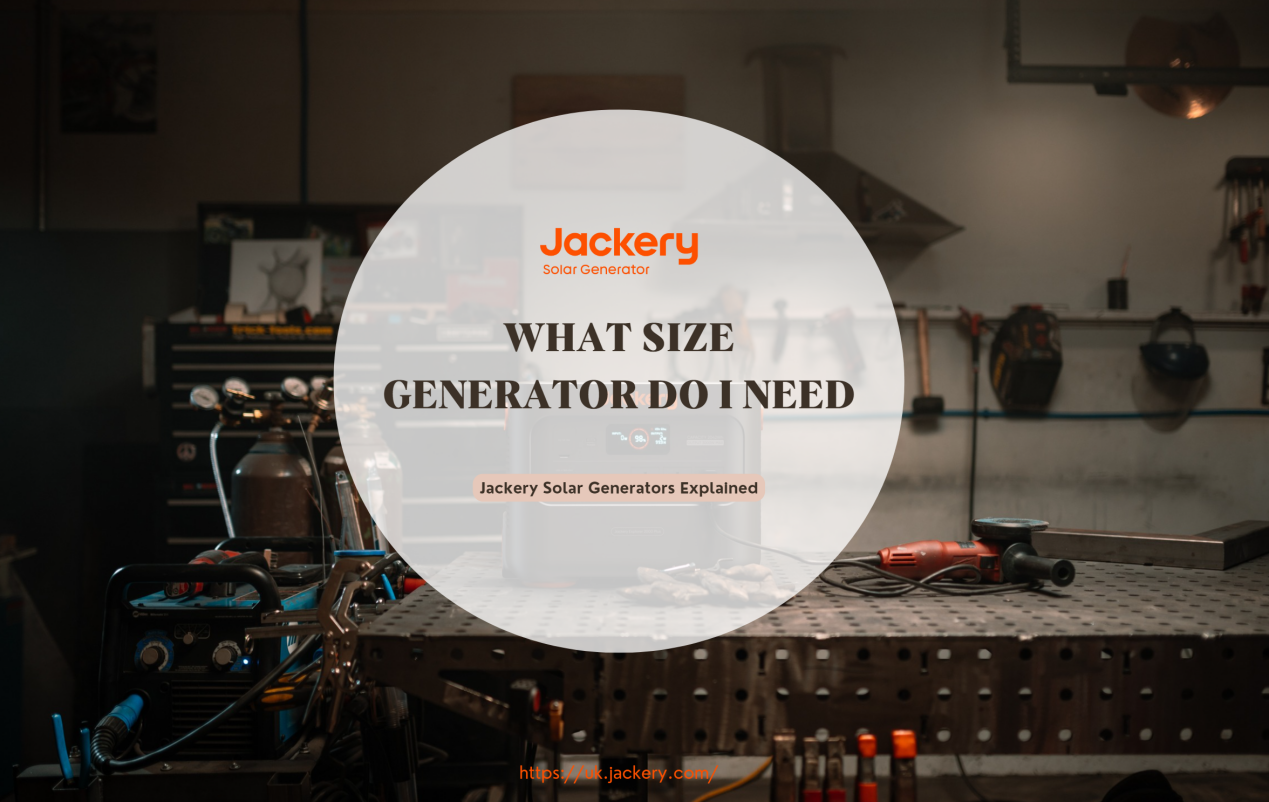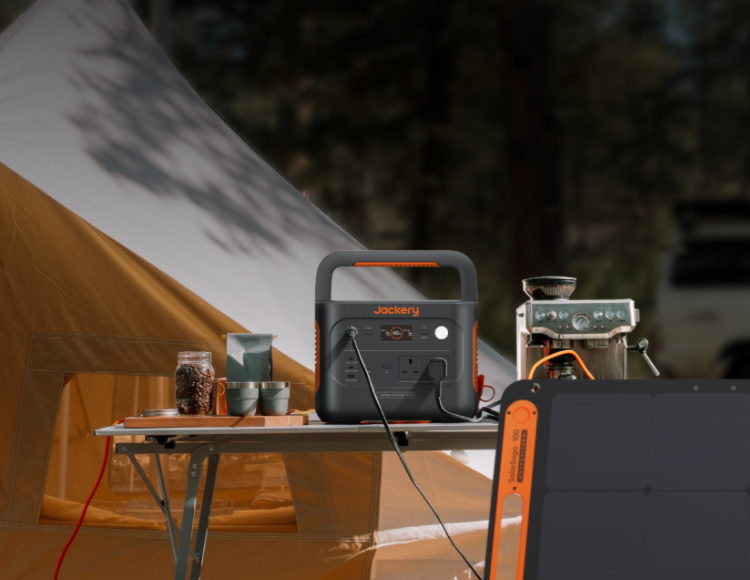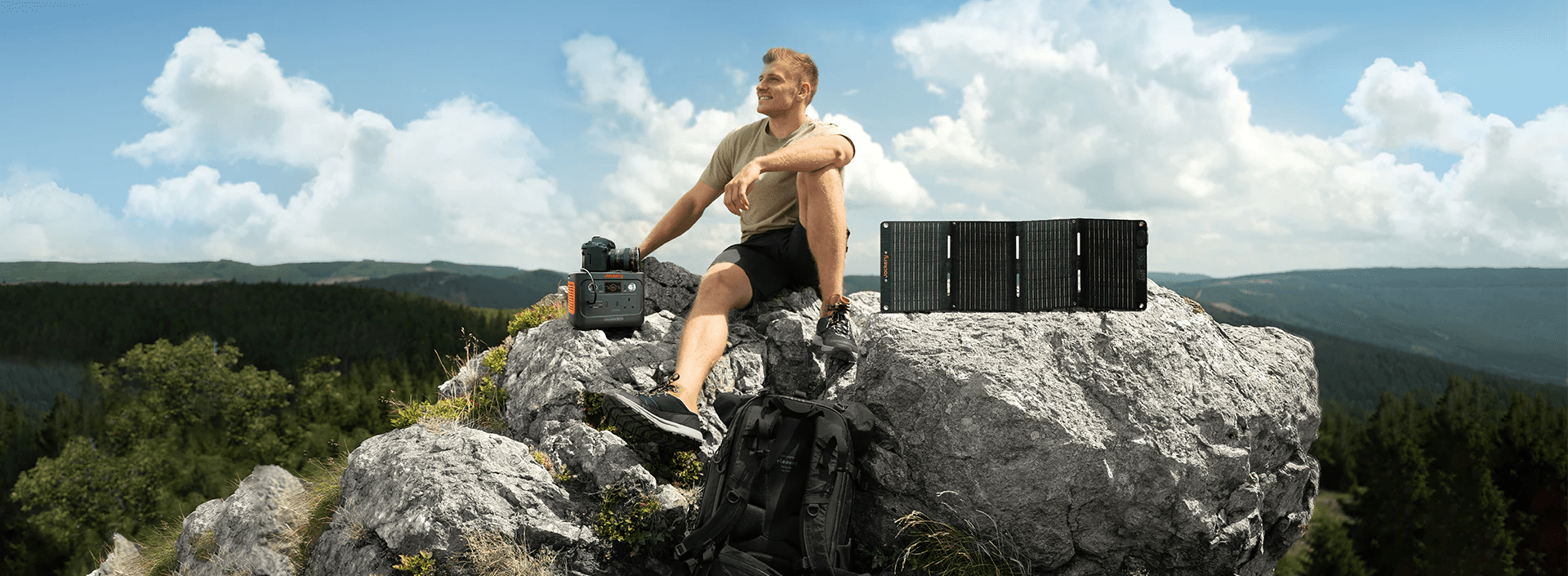The typical UK household experiences 1-2 power outages annually, each lasting around 3 hours. Have you ever wondered what kind of generator is suitable for keeping your home running during a power outage? What size generator do you need?
Of course, the frequency of power outages will affect the generator size you need. The more frequent the power outages, the larger and more powerful the generator you will need to meet your home's power needs.
This guide will show you how to choose what size generator you need for your home or other circumstances. Also, we highly recommend solar generators, such as Jackery Solar Generator, as your reliable backup power supply for indoor and outdoor uses.
|
Key Takeaways: |
|
Generators have become indispensable in every walk of life and everyday life. A properly sized generator is essential to ensuring that your power needs are met during a power outage or other emergencies and that you get a return on your investment. Generator size depends on your power needs. In addition to size requirements, factors such as type, fuel, portability, and noise level must be considered when choosing a generator. We highly recommend the Jackery Solar Generator 2000 Plus and 1000 Plus to charge multiple appliances with solar energy. |
Where Are Generators Used?
A generator is an equipment that transforms mechanical energy into electrical energy. Generators come in different sizes and configurations to meet specific power needs.
When the generator's engine is powered, it spins a coil of wire within a magnetic field, and this motion creates an electric current in the wires, which produces electricity. Finally, the electricity produced by the generator can be used to power electrical devices.
Generators have become an indispensable tool in all walks of life and everyday life. Whether it's a power outage, an outdoor activity, or a backup power source, generators play a vital role when power is needed most.

1. Home
Generators can provide power backup for home life during power outages, minimising disruptions and ensuring personal safety and comfort. Generators can keep your house from being plunged into darkness during a storm and even allow you to do laundry, run the air conditioner, and cook on a stove simultaneously.
2. Hospitals and Medical Centers
Generators provide critical backup power to hospitals and medical centres during emergencies. They help keep lights on in operating rooms, keep vital machines like ventilators and heart monitors running, and prevent refrigerated medications and food from spoiling.
3. Construction SitesGenerators support the regular operation of construction sites because they allow construction teams to have electricity even in places without outlets and power different machines at different locations on the site.
4. Remote Areas
In remote areas or places without access to the power grid, generators are essential to provide reliable power because they keep running the tools and electrical equipment required for work or daily activities.
5. Outdoor Activities
While you may love spending time outdoors, you can also enjoy some modern conveniences at the same time. Generators are often used in outdoor activities such as camping, caravanning, etc. Generators can provide electricity for outdoor activities, such as power lights, heating equipment, audio-visual equipment, cooking equipment, etc., so people can enjoy the comfort of home.
6. Emergency Preparedness
A generator is essential for emergency preparedness in an emergency such as a natural disaster or unforeseen event. It ensures that basic needs are met by powering essential appliances, medical equipment, and communication equipment and maintaining everyday life in difficult situations.
Why Proper Generator Sizing Matters?
Choosing the right size generator is vital to ensuring your power needs are met during a power outage. Selecting a generator that is too small can result in power outages and equipment damage. On the other hand, a generator that is too large can be wasteful and not cost-effective. Here are the reasons why choosing the right size generator is essential:
Cost-Efficient: A generator that is too large has a higher initial cost, consumes too much fuel, and requires higher maintenance costs, which increases the overall cost of using the generator. In contrast, a generator that is the right size for your needs is more cost-effective and less expensive.
Safe and Reliable: A generator of the correct size provides the power to run appliances and other electronics, ensuring they work correctly. But if the generator is too small, the appliances will not receive enough power to operate correctly.
Avoid Equipment Damage: A generator that is too small can cause stress when powering large equipment, making loud noises, overheating, or even malfunctioning due to poor filtration. In addition, there is a risk of fire if the generator overheats. Using a too small generator for a long time can significantly shorten its lifespan, leading to parts failure and frequent repairs.
What Size Generator Do I Need?
What size generator do I need? The answer depends on your needs and how many devices you want to power simultaneously. To calculate your power needs, take inventory of all the equipment you want to plug into a generator.

Step 1: Calculate Your Power Needs
How do you calculate your power needs? Follow these four simple steps to determine your power needs.
- Step 1: Select and list the essential devices you want to power simultaneously.
- Step 2: Check the manual or data plate for each device to find the wattage of each listed, add them up and record that number.
- Step 3: Find the wattage of each device listed and record that number.
- Step 4: Calculate your total power needs by adding the device with the highest wattage requirement.
Step 2: Determine Generator Size
Electric appliances usually have wattage numbers on the bottom, back, or nameplate. To determine how many watts your ideal generator should produce, do a simple calculation:
Total running wattages of all the appliances you want to power + highest starting wattage of the motor-powered appliance you wish to power = minimum wattage required.
Starting wattage is the initial high power required to start an appliance from a complete stop. Running wattage is the continuous power needed to run an appliance already running steadily.
It is essential to list the starting wattages of all the electric appliances you plan to power with your generator. Still, your equation only needs to consider the appliance with the highest starting wattage requirement. While you may be running multiple appliances at once, it is unlikely that you will be starting them all at once.
So, choose the highest starting wattage that will meet the starting wattage requirements of all your other appliances. Adding the highest starting wattage to all running wattages will ensure that your generator can start your appliances individually and maintain their running wattage requirements.
Here are the starting wattage and running wattage values for some common appliances in the UK:
|
Appliances |
Starting Wattage |
Running Wattage |
|
Refrigerator |
2,000 |
750 |
|
Central AC |
12,000 |
4,000 |
|
Ceiling Fan |
500 |
200 |
|
TV |
0 |
120 |
|
LED Light |
0 |
10 |
|
Stove |
0 |
3,000 |
|
Hot Water Heater |
0 |
3,500 |
|
Highest Starting Wattage |
12,000 |
|
|
Total Running Wattage |
|
11,580 |
Ultimately, you'll have the ideal wattage for your generator, which is the size of generator you need. If you can't find the wattage, check if the device is listed in amps. If it is, you can calculate the wattage by multiplying the amps by the voltage using this formula:
Watts = Volts x Amps.
If you have a device that draws ten amps and 120 volts, it has a power of 1,200 watts (10 x 120 = 1,200). If your device doesn't have this information listed, you can check your owner's manual or browse the manufacturer's website to find the wattage for a specific product.
Step 3: Choose Generator Types
There are several kinds of generators. If you are experiencing a power outage or are not connected to the grid, you can use a generator to keep electricity on. You can get the following types of generators for your house or other uses:
Gas Generator: Gas generators are the most widely used type and are an excellent option for low-power tools and appliances. Gas generators are usually the least expensive in terms of pricing, but petrol costs more in the long run than other fuels. This might not be the case in an emergency, even with petrol.
Diesel Generator: In extreme conditions, such as freezing temperatures, diesel generators work well. These diesel generator types are more resilient since the low combustion temperature of the fuel puts less stress on the engine.
Due to their lower fuel consumption per output, diesel generators are more economical than petrol generators. However, as a result, these generators are usually bulkier and less lightweight.
Inverter Generator: Compared to traditional generators, inverter generators function differently. The inverter generator automatically modifies its engine speed to match electrical demands instead of operating steadily. It dramatically lowers fuel consumption and noise levels as well.
Solar Generator: The clean, renewable energy from the sun powers solar generators. This one is the only generator that is safe to use indoors because it produces no emissions. Generally speaking, solar generators don't need much maintenance.
The ideal alternative to a caravan generator is a solar generator, which converts sunshine into clean, endless, and silent electricity by combining solar panels with a portable power station.
|
Types of Generators |
Pros |
Cons |
|
Gas Generator |
Natural gas Common type |
l High emission l Gas is expensive l Flammable l Only for outdoors |
|
Diesel Generator |
More efficient than gas Cheaper to operate Longer lifespan |
l High emission l Noisy l Only for outdoors l More expensive than gas |
|
Inverter Generator |
Quiet Fewer emission Portable |
l Lower power output |
|
Solar Generator |
No emission Used indoor & outdoor Low maintenance Sustainability Unlimited source |
l Relatively expensive but cost-effective |
To sum up, solar generators are the most incredible option for caravans due to their numerous benefits over other types.
Solar generators, such as Jackery Solar Generators, produce pure, sustainable energy that doesn't damage the environment. Because they run on fossil fuels, traditional generators contribute to air pollution and global warming. Moreover, solar energy is an alternative to costly fossil fuels.
Step 4: Common Generator Sizes
Generators come in different power capacities, so consider whether you need a small, medium, or large industrial generator.
By comparison, a small generator has a power of 20,000 watts (20 kilowatts), a large generator has a power of 100,000 watts (100 kilowatts), and a vast generator has a power of 240,000 watts (240 kilowatts) and above.
The following are the generator size references for different purposes:
|
Generator Sizes |
Purpose |
|
1 kW to 10 kW |
A 1 kW to 10 kW generator can help you power several rooms in your home. For example, a 5 kW generator will allow you to operate four lights, a refrigerator, a fan, and a motor. |
|
10 kW to 50 kW |
A 10 kW to 50 kW generator allows homeowners to run more appliances simultaneously, including multiple energy-consuming devices such as water pumps, HVAC units, and washing machines. |
|
50 kW to 100 kW |
Typically powered by diesel, 50 kW to 100 kW generators are ideal for providing backup power for offices and restaurants. |
|
100 kW to 200 kW |
A 100 kW to 200 kW generator provides a power solution for industrial sites, large offices, or any location with many appliances such as computers, lights, fans, and air conditioners. They can run on diesel and gasoline and power fishing boats. |
|
200 kW to 300+ kW |
Large generators from 200 kW to 300+ kW, running on diesel or natural gas, can provide enough power 24/7 for large industries and high-rise buildings with elevators or escalators. |
Jackery Solar Generators Explained
Utilising a solar generator provides numerous advantages. Jackery is a renowned manufacturer in the solar industry, focusing on producing top-notch solar equipment like solar generators, solar panels, and portable power stations.
Jackery Solar Generators offers a dependable green energy solution for RV, caravan, camping, off-grid, and home backup applications.

In conjunction with Jackery Solar Panels, a Portable Power Station facilitates the efficient conversion and storage of more sunlight for future use. By having numerous output ports, you can charge multiple appliances at the same time.
|
Features |
Solar Generator 2000 Plus |
Solar Generator 1000 Plus |
|
Capacity |
2042.8Wh (Expandable to 12 kWh) |
1264Wh (Expandable to 5 kWh) |
|
Life Cycle |
4000 cycles to 70%+ capacity |
4000 cycles to 70%+ capacity |
|
Battery Cell |
LFP (LiFePO4 battery) |
LFP (LiFePO4 battery) |
|
Dimension |
14.7x14.1x18.6 in |
11.14x10.24x14 in |
|
Recharging Methods |
Explorer 2000 Plus + 6*SolarSaga 200W: 2H; Wall Charging: 1.7H; Car Chargring: 25H |
Explorer 1000 Plus + 4*SolarSaga 200W: 2H; Ultra Fast Wall Charging: 100 Min; Car Chargring: 14.5H |
|
Output Ports |
3*AC Outputs: 230V~ 50Hz, 3000W Max, 6000W Surge Peak; 2*USB-A: Quick Charge 3.0, 18W Max; 2*USB-C: 100W Max, (5V, 9V, 12V, 15V, 20V up to 5A); 1*Carport: 12V⎓10A |
2*AC Outputs: 230V~ 50Hz, 8.7A, 2000W Rated, 4000W Surge Peak; 2*USB-A: 18W Max, 5-6V⎓3A, 6-9V⎓2A, 9-12V⎓1.5A; 2*USB-C: 100W Max, 5V⎓3A, 9V⎓3A, 12V⎓3A, 15V⎓3A, 20V⎓5A; 1*Carport: 12V⎓10A |
Jackery Solar Generator 2000 Plus
Jackery Solar Generator 2000 Plus is a cutting-edge portable solar power solution with exceptional performance. Thanks to its substantial capacity and formidable power output, this device can sustain the operation of standard domestic appliances for several weeks and fulfil all the power needs associated with outdoor adventure or professional activity.
The Jackery Solar Generator 2000 Plus allows adding extra battery packs, which boosts the capacity from 2 kWh to a remarkable 12 kWh, thus enhancing the solar charging capabilities significantly. With the ability to be expanded to 3000W, this solar product offers a 30% higher rated power than other 2 kWh solar goods available in the market. Practically all essential household equipment is energised.
The Explorer 2000 Plus is an industry's pioneering add-on battery pack that can be recharged using solar panels. This feature enhances versatility, improves charging efficiency, and reduces charging time. The LiFePO4 battery, with its sophisticated technology, guarantees a lifespan of 10 years, even with daily usage limited to once per day.
- Expandable Capacity: 2 kWh large capacity with up to 12 kWh extended power elevates off-grid living to the next level.
- Ultra-Long Standby: Out of sight, out of mind. The 2000 Plus has an ultra-long standby mode with a 50% charge for up to 2 years!
- Fast Solar Charging: The Solar Generator 2000 Plus takes just 2 hours for a total solar charge (with 6* SolarSaga 200W solar panels). Power source becomes fully independent.

Jackery Solar Generator 1000 Plus
The Jackery Solar Generator 1000 Plus is the best portable power supply for indoor and outdoor uses. It combines Jackery Explorer 1000 Plus with SolarSaga 100W solar panels to use solar energy effectively.
Featuring a 2000W full-power pure sine wave inverter and a stunning 1264Wh long-lasting LiFePO4 battery, the Explorer 1000 Plus offers abundant energy for almost all essential devices. Remarkably, it can increase its capacity to 5 kWh by incorporating up to 3 additional battery packs.
It takes 100 Mins for a wall charge (from 0 - 100% of battery) and 2 hours of solar charging with 4 SolarSaga 200W solar panels. Additionally, the innovative ChargeShield technology and consistent power delivery avoid equipment damage.
- Higher Capacity with Smaller Size: With a 1264 Wh capacity and a 2000W output, the 1000 Plus surpasses other comparable products in power output, enabling 99% of devices to be powered.
- Expandable Capacity: Up to 5 power levels, providing three days of home emergency backup. Versatile for outdoor, household, and emergency scenarios.
- Battery Safety: Equipped with a LiFePO4 battery, the Jackery 1000 Plus offers a robust 10-year lifespan. It delivers a consistent voltage and pure sine wave, guaranteeing the safety of all your electrical devices.

What to Consider When Choosing A Generator?
As a versatile, reliable power source, the contribution of generators to productivity cannot be underestimated. Specifically, generators are an indispensable power source for construction sites, infrastructure projects, and outdoor activities worldwide.
However, some relevant factors remain to consider before purchasing or renting. So, what factors should you consider when choosing a generator besides size requirements?
Generator Type
Generators come in a variety of different types and uses. A small diesel generator can power a chainsaw, while a large propane generator can be used as a home backup generator during a power outage. Here are the characteristics of several common generator types:
|
Generator Type |
Features |
|
Inverter Generator |
Quiet Efficient in fuel Suitable for charging sensitive electronic devices like laptops or phones |
|
Portable Generator |
Compact size Portable Affordable Cannot power an entire home or construction site |
|
Backup Generator |
Whole house generator It can power an entire building. It can turn on automatically to ensure no downtime. Large size Expensive |
|
Towable Diesel Generator |
Portable Powerful power system |
Portability
Portability is crucial when considering a generator for outdoor activities or work sites. Be sure to think beforehand whether you need a stationary or portable generator. Portable generators with handles and wheels are easily transported and moved to different locations. On the other hand, standby generators are fixed and will provide stability and reliability, but they are challenging to carry.
Noise Level
Generators can make a lot of noise, so the noise level is essential. Generators with lower decibel ratings are often quieter, less disruptive, and provide a more comfortable environment. Some manufacturers offer generators with advanced noise-reduction features. Alternatively, you can purchase a separate generator silencer.

Generator Sizing FAQs
The following are the frequently asked questions about what size generator I need.
- How long can a generator run continuously?
The consecutive run time of a generator depends on several factors, including the fuel tank capacity, load demand and generator efficiency. However, referring to the manufacturer's specifications for the specific generator model is essential.
- Can I use the generator in rainy or wet weather?
Operating the generator in wet conditions is unsafe as moisture can damage the generator and increase the risk of electric shock. Always use the generator in a dry and well-ventilated area.
- Are there any generator safety tips when using?
Before using a generator, being familiar with critical safety requirements is essential. For example, you should only install a generator inside your home or garage if gas generators produce carbon monoxide.
- Prevent Wet Stacking: Load bank testing can prevent wet stacking and maintain peak performance by simulating the total generator's load capacity. (Wet stacking is a condition where unburned fuel and carbon accumulate inside the exhaust system, which reduces efficiency and can damage the generator.)
- Don't Back-Feed Power: You may lose back-feed power if you don't use a transfer switch or plug the generator into a wall outlet. Backfeeding power has a high chance of damaging the generator, starting a fire, or sending power back into the utility lines, which could injure workers trying to repair them.
- Keep Children and Pets Away from Generators: Keep children and pets away from the generator when it is in use. Because many generator parts are scorching when in operation, they may cause burns to children or pets.
- Always Have a Fire Extinguisher: You should always have a fire extinguisher in your home to be easily accessible in case of fire, especially if you are using a home generator.
- How often should I maintain my generator?
Generators should be maintained regularly according to the manufacturer's recommendations. Typically, maintenance on a generator includes regular oil changes, cleaning or replacing the air filter, checking the spark plugs, etc.
Final Thoughts
Acquiring generators is not a transient investment. It is vital to ensure one makes the appropriate decision before investing. Therefore, knowing what size generator you need and understanding various guidelines and considerations is crucial.
Using our in-house knowledge and experience, Jackery is always pleased to assist you in making the best choice for your requirements. Regardless of whether you are replacing a generator or purchasing one for the first time, we can help.

































































































